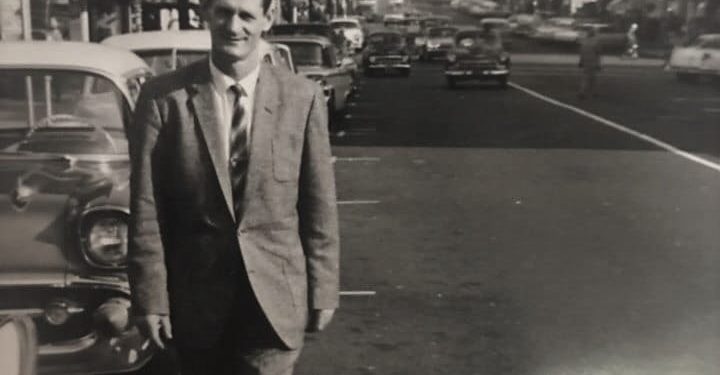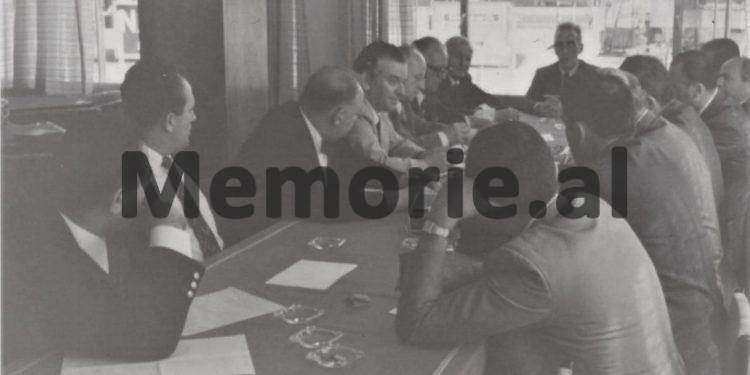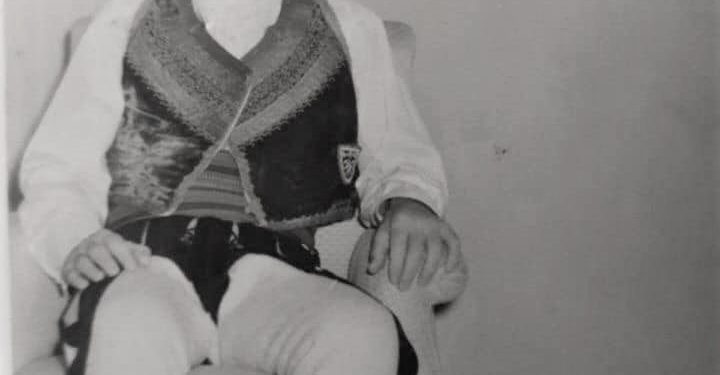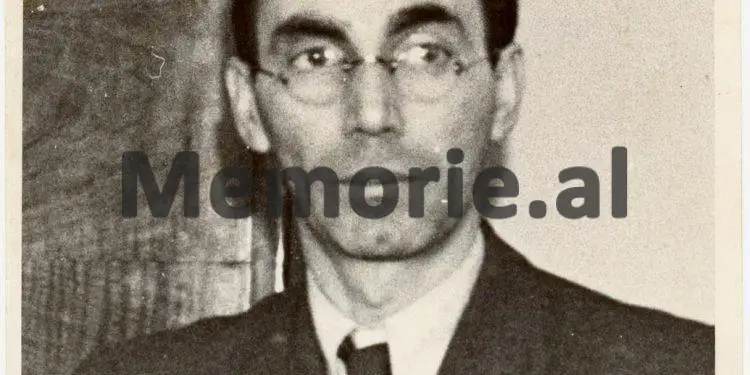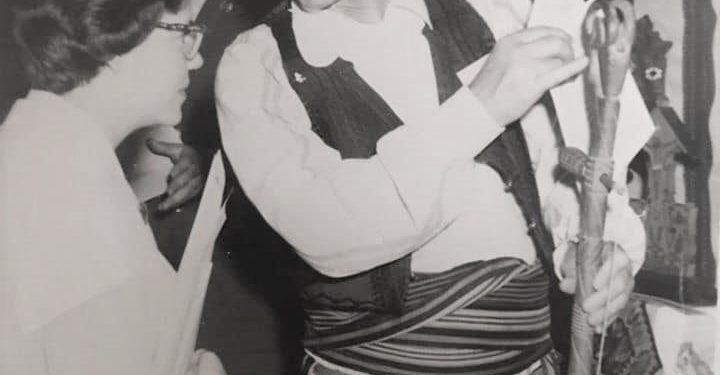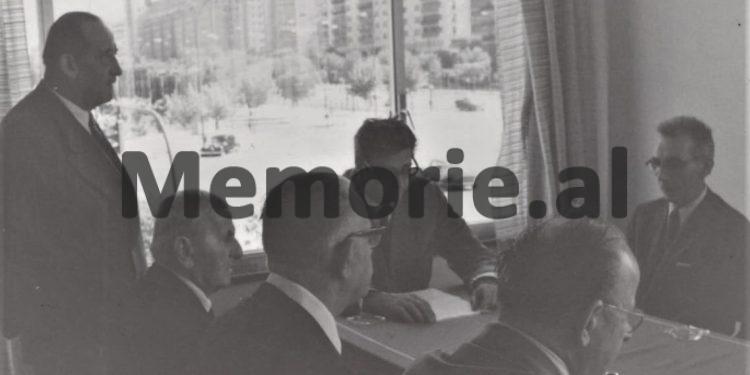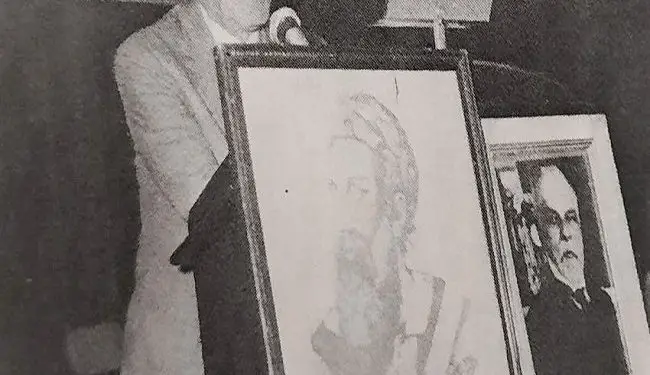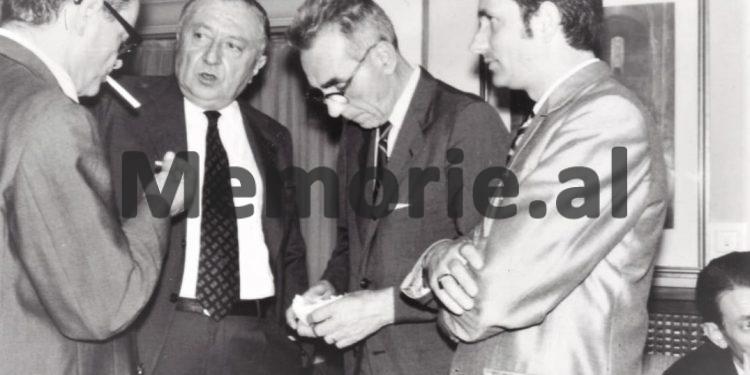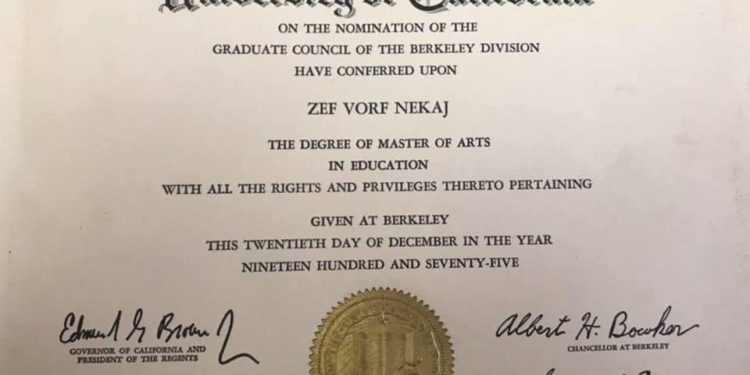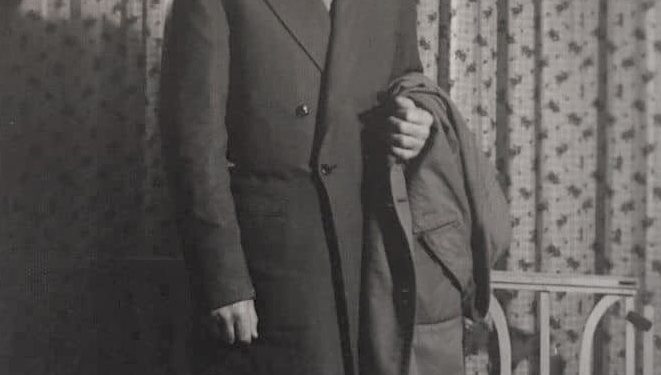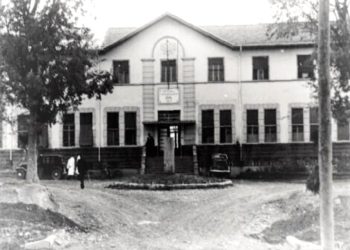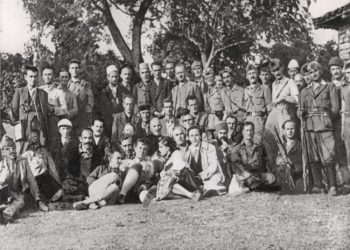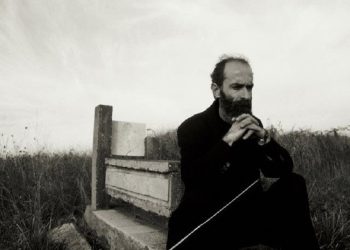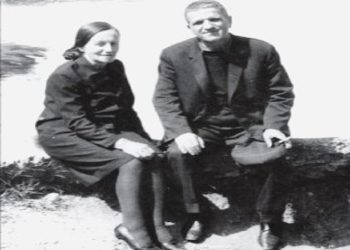By Idriz Lamaj
Part twenty-two
From the works of the apostles of ethnic Albania
Xhafer Deva
In light of his own letters and other diaspora revelations
Preface
Memorie.al/ Probably like many others, I often browse letters with my friends and associates, who are no longer in this life. Browsing through them, for a moment unfolds memories that it seems to me that some of them can serve our history. Then, I return to the awareness of the current difficult situation in the ethnic homeland, caused by the quadruple of Albanian politics, I say to myself: “What can my memories of others or the letters of the people of dead? ”
Without being the ominous instigator of pessimism, thinking as always of a better future, I return to my obligations to my friends, and as an icy observer of time, without any claim of historical service, when I am given the opportunity of publication, write what I have in mind, always based on their writings and letters. This principle is also followed in this book about Xhafer Deva. I knew Xhafer Deva in person; we exchanged visits and had a strong correspondence.
I spent days off at his house and inherited all of Xhafer Deva’s correspondence with Rexhep Krasniqi, his closest friend, for more than 40 years. After many years, I talked on the phone with Mrs. Deva’s daughter and son-in-law. In the conversation going on, taking advantage of the old friendship, I asked about his letters and they informed me that it was all Qefali Hamdia, a friend of their family.
In June of last year (2001) I went to Kenosha, Wisconsin, a guest of Qefali Hamdia, to look at Xhafer Deva’s correspondence, which Mrs. Deva sent her years ago, when she, due to her advanced age, was closed his house to go to the house of his 5th daughter and son-in-law, Mrs. Burgl Dagmar and Rev. Dennis Logie.
After reading the bulk of the letters, in the languages I knew, I took with me more than a thousand pages of his correspondence, covering a period of over 30 years, 1945 – 1978. Xhafer Deva spoke and wrote seven – eight languages. His correspondence is: Albanian, English, German, Italian, French, Turkish and Serbian. Xhafer Deva’s letters and writings, with the exception of those in Old Turkish and Serbian in Cyrillic, are mostly typewritten, well-kept, and alphabetically arranged, with the persons he dealt with.
That includes his family letters. He carefully kept a copy of every letter he sent and every letter he received. Mrs. Oswalda Deva, daughter Burgl, son-in-law Dennis Logie and Mr. Qefali Hamdia with family, expressed his heartfelt thanks for the trust they gave me. With special gratitude I recall here the help given to me by my brothers – Captain Nue Gjomarkaj and Nikoll Gjomarkaj, in the preparation of one of the most important chapters of this book.
Kapidan Nou, in addition to making available the subject on Xhafer Deva’s relations with the ‘Independent National Bloc’ and sending paratroopers to Albania and Kosovo, reviewed with me each document of that period, and we formulated the text in the form of a conversation; while Nicholas, deciphered the letters, transcribed and translated from Italian, the unpublished materials to date, which were published in this chapter.
Continues from the last number
Xhafer Deva’s life and activity in exile
– Kosovo in the time of Ethnic Albania –
Xhafer Deva in the light of his own letters
In the United States.
Gjona Shtufaj
Gjon Shtufaj was born in Gjakova in May 1932. During World War II, the Shtufaj family sided with nationalism; his uncle served as a police officer in Prizren and Vlora. His father was a merchant. With the advent of communism in power, he was proclaimed a kulak. The two brothers stay in the mountains for several years. They surrendered with the announcement of an amnesty in which it was stated that, they would not belong to the fugitives “who have not painted their hands with blood”. During the Italian occupation, Gjoni was a student of Zef Nekaj, who lived in the house of his father, Mark Shtufaj. After the war, John only finished eighth grade school.
At the age of 22, he became a member of a secret group and carried out anti-Yugoslav activities, distributing Albanian flags and slogans against the oppressive Belgrade regime at night. He was arrested on June 17, 1957, together with Adem Krasniqi and sentenced to 7 years in prison. After five years he benefits from a state amnesty and is released from prison. In 1968, he said goodbye to his homeland and has not yet returned home. Deban is informed about his exemplary and patriotic behavior during his stay in prison by Shaban Dërguti. In this way he is engaged in the ranks of the ‘League of Prizren’ and is appointed a member of the Executive Committee. With the assassination of Kalosh Hamdis and the resignation of Hysen Terpeza, the ‘League’ remains without a vice president. With the proposal of Ismet Berisha and the support of his friends, he is appointed vice-president of the ‘League’.
John from the beginning gained the full trust of the Deva and they exchange letters of the friendliest form. After 1978, he gradually withdrew from the ‘League’, lived a family life without engaging in political activities, but always remained faithful to the classical spirit and ideals of the ‘League of Prizren’ and Xhafer Deva. After the end of the Second Congress, the ‘League’ was left without a newspaper editor. Since Deva attached special importance to the press, I told her that I could prepare the newspaper until the editor was found, if Mr. Krasniqi and he helped me with English articles. I also asked
that Prof. Zef Nekaj, to deal with language editing. In this way, the issue of the press was resolved and several issues of the newspaper “Lidhja e Prizrenit” were published, which was highly praised, thanks to the editorial work of Prof. Nekajt.
Zef Nekaj
Zef Nekaj was born on March 14, 1919 in the village of Domgjon in Mirdita to a poor family. He finished primary school in the Mirdita Dormitory, in Orosh in 1930, and the ‘Normal’ school in Elbasan in 1939. After the conquest of the homeland and the unification of Kosovo with Albania, he served as a teacher (1940-1944) in primary schools in Gojan, in Mirdita, Kërçisht, Peshkopi, Prizren, Isniq and Gjakova. In the years 1944-’45 he was a teacher and deputy director of the ‘Normal’ School in Gjakova. In 1945-49 he was sentenced to five years in prison for: “sowing the brother of Yugoslavia among the peoples”; as the indictment wrote.
In the years 1950-‘51 he served as a translator and editor of the “Pedagogical Commission” in Prishtina, under the chairmanship of Prof. Zekeria Rexha, who intervened for his employment. While working in the Pedagogical Commission, Zefi mainly dealt with translations from Serbo-Croatian into Albanian. Within two years (1950-’51), he translated: Pushkin’s ‘Golden Rooster’, poetry, with Prof. Esad Mekuli: Krillov’s ‘Tales’, poetry with Esad Mekuli: M. Alekkovi ‘‘ ‘Jolly Days’; M. Aleckoviit; ‘Kunora e Maleve’ by P. Njegoshi, with Esad Mekuli; ‘Anthology of Albanian Writers’, collaboration with work colleagues; ‘History of Natural Sciences’ for high schools, collaboration; ‘The Society of Pjeter Macallungë’, with Sulejman Drini; Sholokhov’s ‘Lavrueme Lendina’, translated by Vehap Shita, edited by Zef Nekaj, etc.
During his stay in Kosovo, he collaborated with the magazines ‘Jeta e re’ and the Pedagogical Bulletin, where he published many in the field of folklore. After leaving Yugoslavia (1951), Zef Nekaj was the editor of the culture section of the newspaper ‘L’Albanie Libre’, and a contributor to almost all the most popular magazines and newspapers of the Albanian diaspora, such as’ Shejzat e Koliqit ‘,’ Jeta Albanian Catholic ‘by Monsignor Oroshi,’ Albanian Catholic Bulletin ‘by Gjon Sinishta, from the first edition until the death of the editor. It should be noted here that, in no magazine in exile, has it been written about Kosovo, the Albanians in Montenegro and Macedonia, by Albanian or foreign authors, more than in this magazine. Over ninety percent of those studies were written by Zef Nekaj.
He has been a collaborator of the newspapers: ‘Albania of K.K.SH.L., “Vardari”, of Shemsedin Vendresha in Istanbul,’ Free Albanian ‘, body of the Committee “Free Albania” and co-editor of the newspaper’ Lidhja e Prizrenit ‘after The Second Congress of the ‘League’. Zef Nekaj has translated many works, prose and poetry, from English to Albanian, such as; poems about Illyria by Harry T. Fultz, first part and ‘Albanian picturesque dress’ by Faik Konica, prose, etc. In addition to volunteering as a translator, Zefi also did simple work to earn a living. In 1964 he received a BA in Russian Language and Literature from the Institute of Foreign Languages in Monterey, California. In 1975, he received his MA in education and linguistics from the University of Berkeley, also in California.
For years, he was an instructor and compiler of Albanian language textbooks at the Institute of Foreign Languages of the US Department of Defense in Monterey. His writings in various fields, distributed in magazines and newspapers, are voluminous. They are often signed with different nicknames. Zefi used nicknames to avert the persecution of his people in Albania and Yugoslavia, but his relatives nevertheless persecuted him. His father, Vorf Nikoll Kola Nekaj was arrested in Albania in 1949 and served five years in prison. He came out of prison blind and died in 1972.
Xhafer Deva and the Madrid Meeting
In June 1972, Xhafer Deva received an invitation from the Albanian Royal Court, then based in Madrid, signed by King Leka. In the invitation, Xhafer Deva was called to participate in a gathering of political leaders, in an effort to achieve cross-party cooperation. After consultations with Dr. Rexhep Krasniqi and Kalosh Hamdin, Xhafer Deva, immediately authorizes the holding of a meeting of the Executive Committee of the ‘League of Prizren’ to review the invitation. After obtaining the approval of the Executive Council, Dvea comes to New York for a few days, and accompanied by Kalosh Hamdia, goes to Madrid. As expected, the Chairman of the Meeting is elected there.
He corresponded with the Royal Court during the years 1972-1975. The letters he received, although bearing the signature of King Leka, or his authorization, were written by Colonel Hysen Selmani and later by Colonel Xhemal Laçi, former ministers of the Royal Court. The letters do not contain any special significance for the study. Both sides make plans for rapprochement of diaspora political parties. According to the letters, neither King Leka nor Xhafer Deva has any concrete action plan. The gap between the political groups was so great that nothing more could come out than this dry agreement act:
Agreement Act
Following the invitation of His Majesty Leka I, the Albanian parties and groups in exile gathered at the Hotel ‘Cuzco’, in Madrid, on 2 and 3 July 1972, and after reviewing the Albanian and international situation, decided:
- To coordinate the national forces for the security of ethnic Albania, for the overthrow of the anti-people regime that rules today in Albania and for the protection of the country’s territorial integrity from any foreign threat.
- To develop a comprehensive activity in the political, cultural and social field.
- To create a joint press which will faithfully express the decisions taken by today’s Assembly.
- For the implementation and enforcement of the agreement reached are created:
- The Executive Body that will consist of 9 members. The members will elect 196 the Chairman, the Vice-Chairman, the Secretary and the Treasurer.
- The Advisory Body will consist of so many members that political parties and groups will decide on the next Statute. For the election of the chairman, the vice-chairman and the secretary, the same procedure will be followed as provided in letter A, of article 4 and 5.
All political parties and groups that did not participate in this assembly as well as personalities of the Albanian world known for their national activity will be invited to participate as after the agreement reached today.
- The Joint Body shall be held with the input of the signatory parties as far as possible.
- The competencies of the bodies of this agreement will be determined by a special regulation.
- With the approval of the Statute, the activity of political parties and groups must be developed in accordance with the spirit and letter of this agreement.
- How the consent has been obtained from the central committees of the signatory parties to this agreement, the Statute will be drafted, which immediately after the signing, will take the final form for all legal effects.
- Until the approval of the signing of the Statute, which should not exceed six months, an interim Steering Council is established which will direct the overall activity of the Joint Body?
- To meet the initial needs of the Interim Governing Council, the Assembly shall make available to that Council the sum of $ 1,600 (one thousand six hundred).
- The Assembly recognizes that the activity carried out to date by the Committee “Free Albania”, under the same conditions, to continue its work in the future.
- To give the necessary moral and material support to the Pan Albanian Association “Vatra”, in order to develop its activity as in the past.
- To cooperate regularly with the League of Prizren, until the achievement of its goals.
- The “Free Albania”, “Prizren League” and “Vatra” Committees, due to their special character, are not subject to the provisions of this agreement.
- On the occasion of the approval of the Statute, the name of the Joint Body will be determined by the signatory parties as well as the persons who will be members of the Executive Council and the Consultative Council.
- This agreement will remain in force until the day of the liberation of Albania.
- The Interim Steering Council will consist of the signatories: Gentlemen: Dr. Halim Begeja, Prof. Theodor Papalilo (‘Agrarian Party, National Front’, H. Dostit Group), Dr. Fuat Myftia and Hysen Mulosmani (O. K. L. Legality), Isa E. Ndreu (‘Katundare Party’), Nue Pjeter Gjomarkaj (‘Albanian Heroism’), Ymer Bardhi (‘Albanian Union’).
Below, the signatures of the above-mentioned persons continue, where the signature of Deva and Kalosh Hamdis on behalf of the “League of Prizren” is also found. The signature of the representative of the Committee “Free Albania” and the signature of the ‘Independent National Bloc’ which was represented by Dr. Gjon Buçaj, in the position of observer. Mr. was also an observer. Hajdar Tonuzi, on behalf of the “Vatra” Federation. After the Madrid Assembly, Xhafer Deva tries to implement the decisions taken by the parties, but in vain.
Continues correspondence with various political figures of the diaspora and with the Secretary of the Meeting, Lec Shllaku, who were in charge of continuing the inter-party talks. In order to have a more realistic picture of this meeting, one should browse the correspondence of Deva and Shllaku. The reason we brought this short chapter to ourselves is that the press of the Albanian political emigration of that time, said a lot about this meeting. Groups interested in propaganda echo them, while in reality, Xhafer Deva, melted all his energies of his last years, without achieving any success.
In Deva’s letters we learn two things about his commitment. He attached importance to King Leka’s political contacts with Western political circles and dreamed of a joint press, a single newspaper on party levels: “If anything emerges from this meeting, the publication of a single newspaper, on party levels, A single newspaper, in the name of all political currents, a newspaper in the sense of party, can only be published by the “Free Albania” Committee. Rexhepi is the only one who can maintain the balance and provide the newspaper with the necessary seriousness. “I will do my best to convince Rexhepi and Idrizi to take on this difficult task,” he wrote to Shllaku, on April 21, 1973. Memorie.al




